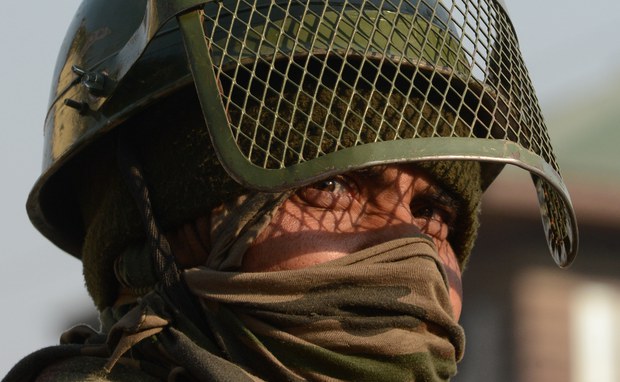India Battling Serious Threat from IS: Analysts
2016.02.03
 An Indian police officer looks on during search operations in Srinagar, Jan. 24, 2016. The National Investigation Agency reported arrests of 14 suspected Islamic State sympathizers ahead of the country’s Republic Day.
An Indian police officer looks on during search operations in Srinagar, Jan. 24, 2016. The National Investigation Agency reported arrests of 14 suspected Islamic State sympathizers ahead of the country’s Republic Day.
A string of recent arrests of suspected Islamic State (IS) sympathizers in India signals that IS poses a major domestic threat, security experts said, even though they voiced doubt about the extremist group having any organizational structure inside the country.
“It (IS) is becoming a serious threat for India,” R.S.N. Singh, a former official with the Research and Analysis Wing, India’s external intelligence agency, told BenarNews.
More than a dozen arrests last month of suspected IS sympathizers throughout the country had increased the threat perception, he added.
“The IS, it seems, is creating a new pan-Islamic wave to lure India’s educated youth,” Singh said.
‘Scapegoat’
The National Investigation Agency (NIA) arrested 14 suspected IS sympathizers in a nationwide sweep ahead of India’s Republic Day, which was observed on Jan. 26.
On Jan. 28, the United Arab Emirates (UAE) deported three Indians suspected of being IS recruiters.
Sheikh Azhar al-Islam, from Jammu and Kashmir, Mohammed Farhan, from Maharashtra, and Adnan Hussain, from Karnataka state, were arrested after being questioned by the NIA upon their arrival in India the next day. All three men are in their 20s.
Interrogations revealed that the trio was involved in identifying, radicalizing, recruiting and training Indian youth for terrorist attacks in the Indian subcontinent, according to the NIA.
But a relative of one of the deportees challenged those claims.
“They (NIA) are fabricating all this, that he has links with IS,” al-Islam’s brother, Sheikh Zubair, told BenarNews.
“My brother holds a bachelor’s in education degree and had got a good job in the hotels industry in the UAE just a few months back. Why would he suddenly join the IS? I think he is being made a scapegoat,” Zubair said.
Indian offshoot
The NIA claims that with these arrests, it broke up a major Indian IS cell called Junood-al-Khalifa-e-Hind, which planned to carry out attacks across India in 2016.
The arrested suspects were part of a “well-oiled structure,” with each individual carrying a designation in the Indian group’s hierarchy, said a report by CNN-IBN, which claimed to have accessed the suspects’ interrogation report.
Muddabir Mushtaq Shaikh, who hails from Maharashtra, is proclaimed as IS’s “Amir-e-Hind” who is in charge of overall operations, scouting and planning in India, the report said.
It added that a 16-year-old boy from Uttar Pradesh was his deputy and instrumental in securing safe houses and hideouts for training potential militants.
Both Shaikh and the juvenile, whose designation is said to be “Nayab Amir” (second-in-command), were among the 14 arrested in the anti-terror sweep late last month.
“Nazbul Huda, who was arrested in Bengaluru, is the ‘Amir-e-Askri’ or their military commander. Nafees, who was arrested in Hyderabad, is the ‘Amir-e-Maliyati’ or the head of their financial operations,” CNN-IBN said, citing the interrogation report.
All 14 suspects arrested last month and the three alleged IS recruiters deported last week were “radicalized and handled” by Syria-based Yusuf al-Hindi (alias Mohammad Shafi Armar), according to the report.
Armar, a former Indian Mujahideen member, is believed to be a “top recruiter and handler for IS-inspired youth in India.”
Indian security agencies, which had dismissed the possibility of an IS foothold in the subcontinent, have arrested or detained more than 30 people with leanings toward the terror group since late 2014. A majority of those arrests occurred after IS-claimed terrorist attacks in Paris that killed 130 people on Nov. 13.
Catching them young
Daniel Koehler of the Berlin-based German Institute of Radicalization and Deradicalization Studies, believes that India is a major IS target because of its “very large Muslim Diaspora, regular conflicts with a Muslim country” and “clashes between Hindus and Muslims on a regular basis.”
“This provides for a very stable breeding ground for jihadist radicalization and recruitment,” Koehler said in an interview with news portal Rediff.
That more than half of those held for alleged links with IS are under the age of 25, with at least two being minors, is a major cause for worry for Indian security agencies, experts said.
“As it seems, IS is targeting the young and impressionable for recruitment, which is a worrying sign,” Stanly Johny, an IS expert who writes for The Hindu, told BenarNews.
He raised doubts over the NIA claim that the terror group had a well-organized footprint in India.
“India does not face any organizational threat from Islamic radicals. That’s because the rituals of Islam in India are completely different from the ideological base of groups like IS, which follow Wahhabism,” Johny said, referring to an ultra-conservative branch of Sunni Islam, which has inspired IS.
“It has happened before, when the police have arrested people and the court has later released them for lack of evidence. We can’t rule out the possibility the investigators might be making large claims without much proof,” Johny said.
Adeel Shah contributed to this report.







